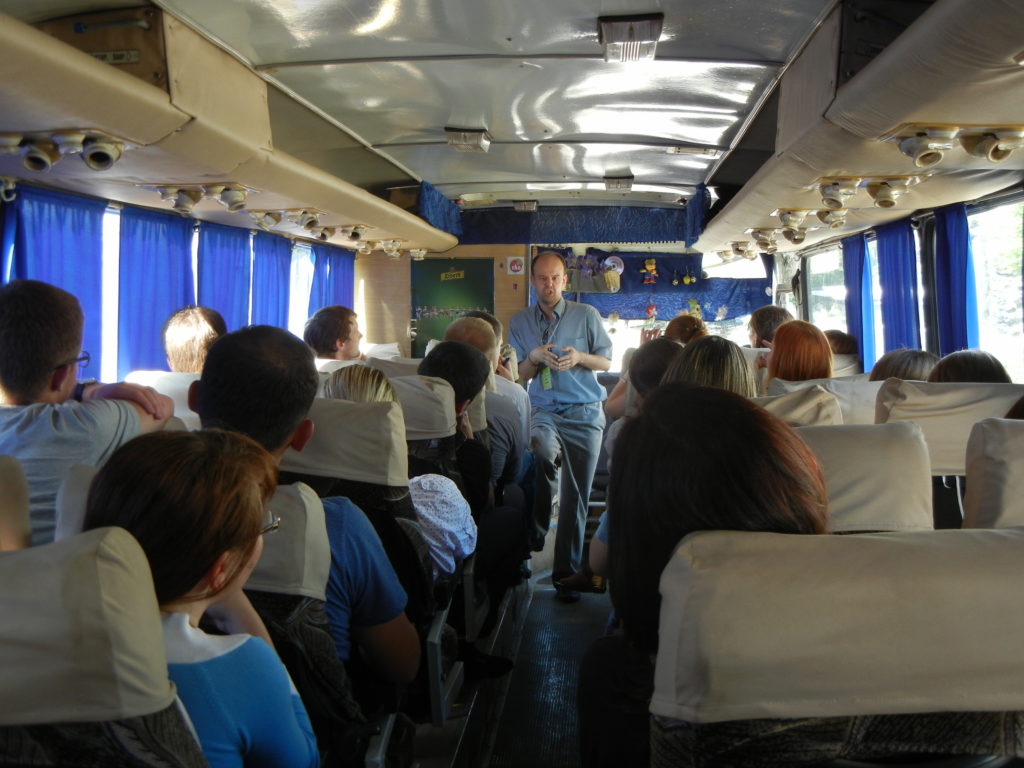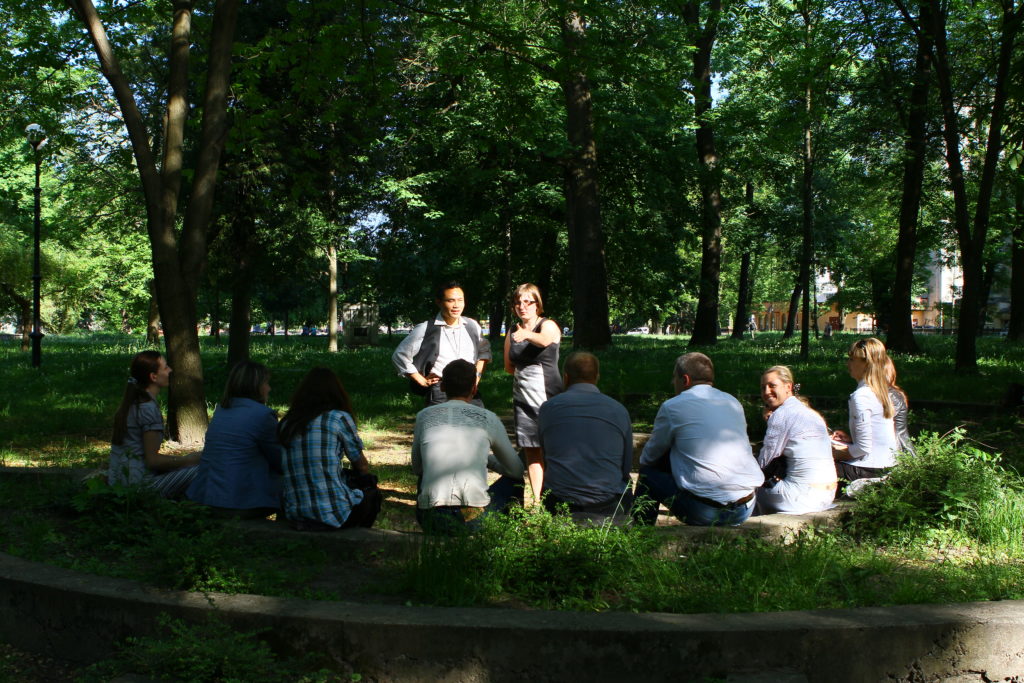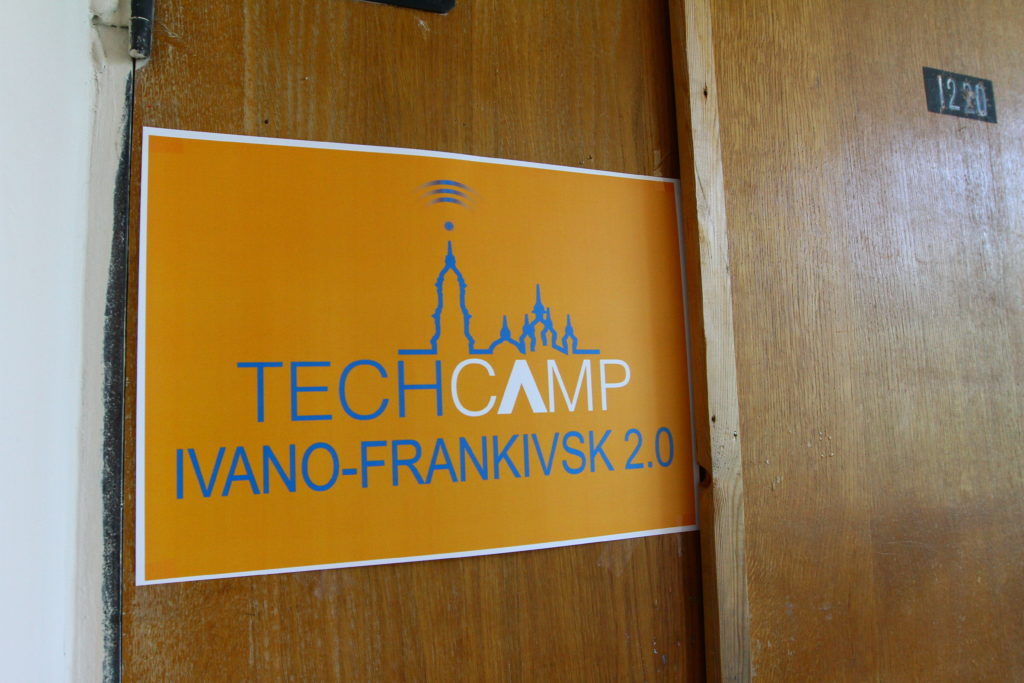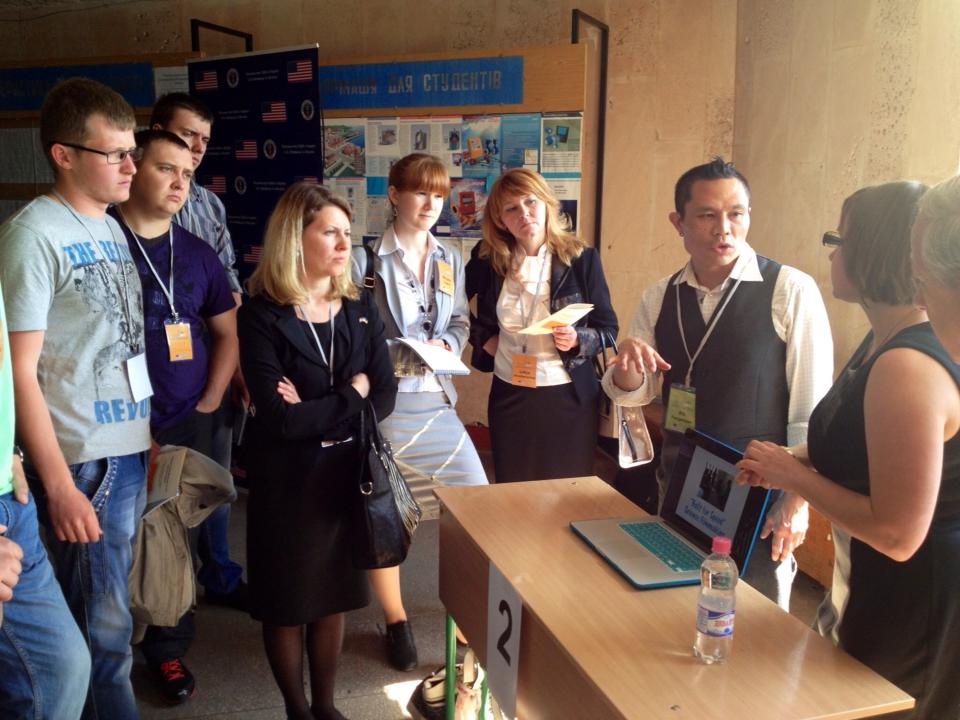Today was so strange I don’t even know where to start.
I’m in Ivano-Frankivsk, a small city in Western Ukraine, where I was brought by the US Embassy to lead some trainings in digital media for local NGOs. I’ve done a few of these technology trainings for civil society organizations around the world, and had not really thought of our conference as being in any way controversial or threatening.
But I guess at least one person felt threatened, because shortly after I finished my first workshop, we received a bomb threat on the building.
I couple of months ago, I was invited by the US Embassy in Kiev to be a trainer for a series of civil society workshops called “TechCamps” that have been organized all over Ukraine for different local nonprofits. It seemed like a great honor and opportunity to travel to Ukraine to help with this one-day training, even if it was in a small city that I could barely pronounce called Ivano-Frankivsk.
The plan was for me and three other tech trainers to lead three workshops for about 60 local NGOs, as well as other interested individuals. This was part of a larger effort of the State Department to encourage civil society around the world, from Mumbai to Mexico City. For the camp, I had prepared a set of slides, talking points, and activity aids. I was assigned a sweet and friendly local interpreter Irina to assist me all day.
I had a really great group for my first workshop, a dozen people who were activists, students, librarians, journalists and tech entrepreneurs. They seemed to enjoy my talk about how I work with young people to get them engaged with the world using digital media. And they were very enthusiastic about tackling the interactive game that I facilitated for them.
This was around 12:55, when I was wrapping up this first workshop. In theory this was our lunch break before our next session at 1:55. Instead, we found the hallway blocked by stone-faced police officers who were telling us that there was a bomb threat. Worse, they wouldn’t let us leave the hallway, which seemed a strange thing if there was a bomb in the vicinity.
There was a lot of eye-rolling among the other Ukrainians. Many of them, as I understand it, don’t have much faith in their local police, viewing them as either incompetent, corrupt or both. My interpreter mentioned to me that the last time she was in this building, there was another bomb threat, which was widely believed to be caused by a student who didn’t want to show up for exams.
Eventually we were allowed to leave the hallway, but just to stand right outside the doorway of the building. Again, a curious place to be put if there was indeed a credible bomb threat.
After some minutes, the police decided to move us to the gymnasium of the university where we were meeting. We were shuffled in there, along with many other students, perhaps some 100 of us. Strangely, another group from our conference was allowed to stand outside the gym.
Police officers were setting up tables to take our names and ask us questions about the bomb threat, presumably to figure out which one of us did it? This seemed strange, since it seemed like a bomb threat could have originated from anywhere, not necessarily from the participants in this conference or local students at the university.
The longer we were there, the more police showed up. Not just regular cops, but two bomb dogs, an explosives expert, and their “elite” unit that looked like commandos to me. Meanwhile, a bored group of firefighters hung around near their fire truck falling asleep. No EMTs or ambulances were nearby, which was also strange if this was being treated as a bomb threat.
There were a series of other incredibly frustrating delays that the police imposed us that day that basically threatened to scuttle the whole conference. I won’t bore you with the details because it’s well past midnight and I can barely type. But suffice to say, none of their actions seemed to have anything to do with public safety and seemed to have everything to do with preventing us from continuing the conference.
Apparently this is only the latest in barely disguised tactics by the government to stop these TechCamps from happening in Ukraine. The last TechCamp held in another city had 200 “protestors” whom the police did nothing to stop from destroying the door to the conference, disrupting it, and then departing without any of them being detained or arrested. Meanwhile, all of the conference participants were detained and questioned by the police.
It seems that civil society using digital media here is viewed by some authorities as a threat to the established order. And that “danger” seems to warrant some heavy-handed efforts to stop these trainings from occurring.
The great thing is that the organizers and participants didn’t let these actions stop us from continuing to meet. We did have to get creative though.
The police and the university first tried to keep us from leaving the area and holding the conference elsewhere by saying it wasn’t “safe.” Then when the university supplied us with a bus, they kept it from leaving for nearly an hour.
In response, we just resumed our conference on the bus. Two of our trainers gamely gave their presentations on a packed and hot bus for the remaining participants. I was very impressed and not really sure I could do the same.

Eventually, the bus did get moving, although not without the police delaying it’s progress. We at some point got to this lovely local park, where we held one final truncated workshop session.

For my participants, all I could do was hold an open brainstorming session with them about how different technologies could be used to respond to local issues — for example police repression. We discussed everything from Facebook, YouTube, gaming and geolocative systems like FourSquare.
There was a lot of laughter and sharing of funny ideas for games that made fun of the police or how corrupt their viewed their government. One of them asked, “but what does this change if we make a game about how bad things are?”
I told them about “Ayiti,” the game about poverty in Haiti that has given millions of kids and adults around the world an intimate view of the kinds of choices a poor family in Haiti has to make to survive. Rather than be depressing, the game has inspired people to connect with the stories of the poor in Haiti, around the world, and in their own backyards, and to take some small action to help.
The key for any game is that when you are playing, I explained, you ARE that character. You control them and in some way feel for them when they suffer, and celebrate with them when they do well. If you can create a game that makes the player feel something, you have them. After that, you can connect the player with others around the world who have been inspired or moved by the game. And you can give that player a voice, by asking them to share what they learned online with others. All of those things are important first steps in raising awareness and giving hope.
I do believe those things, but it seemed hollow for me to say it to these people, knowing that I was leaving to go back to sunny California in my cushy job at a major science museum. They seemed to enjoy my session though and thanks me later profusely.
After all that, it was a beautiful day in Ivano-Frankivsk. The sun was out, a cool breeze was blowing, kids were playing in the park with their parents nearby. One could imagine that we lived in a better world where people were free and the police existed to protect their freedoms not take them away.
I wish I had answers for these Ukrainians for how they could struggle against repression. Instead, my technology solutions and suggestions felt hollow and insignificant compared to what they faced everyday. It was a strong reminder to me about how powerful digital media can be, and how empowering people with these tools of communication and organization is vital to a democratic modern society.


